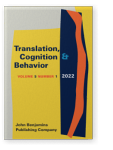Vol. 5:1 (2022) ► pp.144–164
How useful? How important? How difficult?
Triangulating factors to determine expertise in English-to-French questionnaire translation difficulty
English ‘gradation’ expressions—the interrogative adverb how followed by an adjective or an adverb—are frequent in questionnaires and they are not straightforward to translate into French. A good translation approach is needed, and there are mainly two options: The recommended approach involves the French adverbs à quel point or dans quelle mesure. The second approach uses a direct question, and the gradation occurs by choosing one of several options in the pre-established answer scale. Could there be a link between questionnaire translators’ expertise and the way they handle these translations, both the product and the process? This exploratory project studied six professional questionnaire translators, whose performance was recorded with concurrent think-aloud and keylogging techniques, and then triangulated. Correlations were analysed qualitatively. The results revealed a link between the questionnaire translators’ expertise and their translations. This confirms the importance of relying on expert translators and further briefing and training them to become good questionnaire translators.
Article outline
- 1.Introduction
- 1.1Expertise in questionnaire translation
- 2.Data and methods
- 2.1Independent variables
- 2.2Dependent variables
- 2.2.1Were expressions translated with the gradation or the direct approach? (TAPs and keystroke logs)
- 2.2.2Was gradation mentioned as problem?
- 2.2.3Did translators mention having learned to translate this type of question with the gradation approach?
- 2.2.4Pauses while translating these expressions
- 2.2.5Did translators search on the Internet how to translate this type of expression?
- 2.2.6Number of attempts, intermediate versions, and corrections
- 2.2.7Number of non-letter keystrokes and mouse movements
- 2.3Data analysis
- 3.Results
- 4.Discussion
- 5.Conclusions and further research
- Notes
-
References
